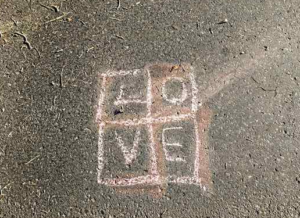
by Rivera Sun for Campaign Nonviolence and Peace Voice
Many people in the United States are expressing concern over the rise of hatred, hate crimes, bigotry, racism, sexism, and Islamophobia. At the same time, a number of creative nonviolent responses have arisen for addressing discrimination and hatred on the ground. Here are a few stories from the past few weeks.
In Michigan, after someone threatened a young Muslim woman that he would set her on fire if she did not remove her hijab, the Muslim Student Association decided to hold a group Ishaa prayer (which happens at night) at University of Michigan to show that they are proud to be Muslim and will not let hatred and threats push them into fear. Concerned that there would be pushback, they asked allies to join them. To the MSA’s surprise, two hundred non-Muslims showed up on the cold night to stand guard in a protective circle around them. Read more about the story here.
In Sarasota Springs, Florida, swastikas were spray-painted on buildings and streets. One inspired person turned them into a message of love. The unknown person connected the legs of the swastika into a square where each section contains one of the letters L O V E. This was a smart and creative response to a symbol that has become synonymous with white supremacy, violence, and hate.
In response to concerns that president-elect Trump would follow through with his campaign comments about establishing a Muslim registry and requiring all Muslims to sign up, thousands of non-Muslim Americans pledged that they would put their names on the registry if their Muslim brothers and sisters were required to do so. Jonathan Greenblatt, the head of the Jewish Anti-Defamation League, said that he would, too. “If one day Muslim Americans will be forced to register their identities, then that is the day that this proud Jew will register as a Muslim,” Greenblatt said.
Sanctuary Cities nationwide state their positions: they’re not backing down. Sanctuary Cities are municipalities that adopt a range of policies that resist unjust immigration laws and deportation practices. Since Election Day, mayors and police chiefs in more than 10 major cities, including San Francisco, Oakland, Los Angeles, New York, Chicago and Washington, D.C., have reaffirmed their commitment to upholding their sanctuary polices, even in the face of federal threats. Learn more about this here.
The Denver City Council issued an official proclamation to all of its citizens, announcing its position on inclusivity, justice, and freedom from fear of persecution. One part of the proclamation reads: “We commit to evaluate our systems of government with an inclusive lens. Our communities will foster and ensure equity, social justice, and freedom from fear of persecution based on race, religious belief, country of origin, sexual orientation, gender, physical ability, or age. Specifically, we must work together to support our brothers and sisters in communities of color, LGBTQ, immigrants, refugees, and those of the Muslim and Jewish faiths who at times have been targeted in unjust ways.” Read the whole proclamation here.
Everyone has heard of the outspoken comments of the cast of the musical Hamilton. Vice-president-elect Mike Pence was in the audience and treated to a respectfully, but clearly worded statement from the performers. Cast member Brandon Victor Dixon said, “We, sir — we — are the diverse America who are alarmed and anxious that your new administration will not protect us, our planet, our children, our parents, or defend us and uphold our inalienable rights,” he said. “We truly hope that this show has inspired you to uphold our American values and to work on behalf of all of us.” The statement set off a storm of reactions nationwide, including from president-elect Donald Trump. Pence, however, said he was not offended, and that the statement from the cast was, “what freedom sounds like”. Learn more about the story here.
At Baylor University in Texas, a student harassed a young black woman, Natasha Nkhama, on Election Day, shoving her off the sidewalk and saying it was for whites-only. Two days later, 300 students walked with her to class to take a clear stand against racism and discrimination. Using the hashtag #IWalkWithNatasha, they provided a powerful message to a nation reeling from the election results. They also tapped into the strength of collective action and protective accompaniment to ensure that the harassment not repeated. See videos and read the story here.
In many other places across the United States, including Gainesville, FL; Beloit, WI; and Detroit, MI, people took to the streets in demonstrations, marches, and rallies to proclaim their solidarity and common humanity with all human beings. These actions focused on common humanity, rather than political figures, and emphasized love and support for those who are feeling or being targeted by hate speech, policy proposals, or potential cabinet choices of the incoming administration.
All of these actions, and many more, offer us examples of how we can organize and mobilize in our communities to take clear and proactive stances in support of respect, dignity, human rights, civil rights and liberties, inclusion, safety, and justice.